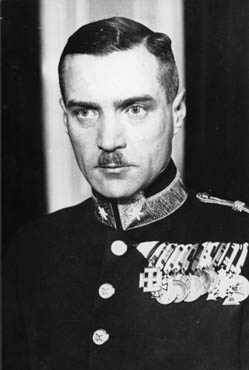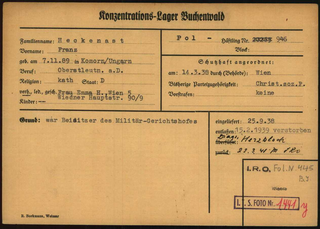Oberstleutnant Franz Alois Heckenast

Personalia
Born:
Died:
Profession:
Persecution:
Imprisonment 14.03.1938 - September 1938,
Buchenwald concentration camp September 1938 - 15.02.1939,
Released 15.03.1938,
Murdered 15.02.1939
KZ Number:
Honors:
Papal Cross of Honor Pro Ecclesia et Pontifice
Memberships
Curriculum Vitae
Franz Heckenast was born in Komorn in western Hungary. He attended elementary school in Chiesch near Karlsbad in Bohemia, then two classes at the State Realschule in Vienna and two classes at the Militärunterrealschule in Eisenstadt. After leaving school in Eisenstadt, he attended the Military Secondary School in Moravian-Weissenkirchen and the Technical Military Academy in Mödling. On August 18, 1912, he finally joined the k.u.k.
Franz Heckenast took part in the First World War as a lieutenant right at the beginning and returned from the war as a captain. After the collapse of Austria-Hungary, he was accepted into the newly organized Austrian army in 1920.
In the interwar period, Franz Heckenast was involved in Catholic Action, military chaplaincy and the "Catholic German Soldiers' Association" (KDSB), of which he was the founding chairman. The staunch Catholic and Austrian patriot, who received the Papal Cross of Honor Pro Ecclesia et Pontifice in 1933, was committed to opposing National Socialism from the very beginning. In his speech on the occasion of the General German Catholic Congress, which was held in Vienna from September 7, 1933 to September 12, 1933, he expressed his clear rejection of National Socialism, which he saw as the main enemy of faith, the Church and Austria. He was an assessor at the trial of the National Socialist murderers of the non-democratic and authoritarian Chancellor Dollfuß and the participants in the National Socialist July Putsch. He continued to campaign vehemently against National Socialism. On January 1, 1938, he was promoted to lieutenant colonel in the Austrian army.
On March 14, 1938, two days after the occupation of Austria by the Third Reich, Franz Heckenast was arrested by the Gestapo and dismissed from the army on March 15, 1938 through forced retirement. In September 1938, he was finally deported to Buchenwald concentration camp. Survivors report that Franz Heckenast never allowed himself to be broken and remained true to his faith, his principles and his belief in Austria to the very end.
On March 14, 1938, two days after the occupation of Austria by the Third Reich, Franz Heckenast was arrested by the Gestapo and dismissed from the army on March 15, 1938 through forced retirement. On September 25, 1938, he was finally deported to the Buchenwald concentration camp. Survivors report that Franz Heckenast never allowed himself to be broken and remained true to his faith, his principles and his belief in Austria to the very end.

After the liberation of Austria and the re-establishment of the Republic in April and May 1945, his wife Emmy Heckenast joins the newly founded Austrian People's Party (ÖVP) and the ÖVP comradeship of the politically persecuted and confessors for Austria.
Places
Residence:
Memorial:
Death Place:
Citations
- Dokumentationsarchiv des österreichischen Widerstands (DÖW)
- Mikrut, Jan (1999): Blutzeugen des Glaubens. Martyrologium des 20. Jahrhunderts (Wien), p. 99–105.
Wiener Stadt- und Landesarchiv (WStLA)
Arolsen Archives
